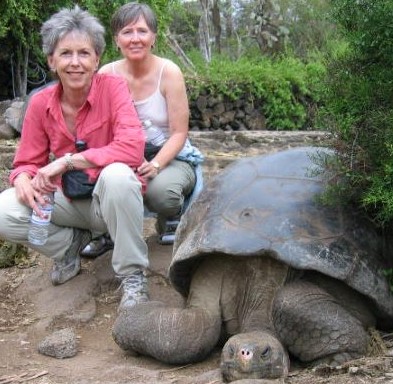
Conversations:
Lynn, thanks so much for talking to CONVERSATIONS today. Let’s talk GIST. What is GIST? As most people haven’t heard of it and if they have, they probably know little about it.
Lynn Whelan:
GIST is a very rare cancer….a type of sarcoma called a Gastrointestinal stromal tumor. It affects approximately 5,000 people in the US and I am not sure what the numbers are internationally.
Conversations:
That’s pretty rare. Where in the GI does it usually manifest itself? And for those that don’t know, what is a sarcoma?
Lynn Whelan:
A sarcoma in general is relatively rare and is a tumor of the soft tissue and can be anywhere in the body. GIST tumors originate in the stomach or in the connective tissue outside of the intestinal tract. Metastasis can be most anywhere in the body but the first site is usually the liver.
Conversations:
I understand. Thanks for clarifying that. Lynn take us back to the beginning. How were you feeling BEFORE you were diagnosed with GIST (Gastrointestinal stromal tumor)?
Lynn Whelan:
I have always been a very healthy person, so much so that I rarely saw a doctor. I have always been very athletic/active and a fulltime Physical Therapist by occupation. One night as I rolled over in bed I was awakened by an excruciating pain in the mid-right side of my abdomen. I could barely get out of bed. My first thought was appendicitis or a gall bladder issue though I had had no such prior issues. As I dragged myself out of bed, I went to the computer (!!) and started trying to figure out what the pain was from. I took an antacid and figured I couldn’t deal with it further until the morning. I laid in one position all night long and when morning came, I felt less pain and so I went to work! Since it was a Friday, I figured I’d better call the doctor since the weekend was coming up. She said come right in! As she palpated it was clear that the excruciating pain was still there but less obvious. By the look on her face I knew I had a serious problem of some sort. She ordered a CT scan, an ultrasound and appointment with her the following Monday when she would have the results. I did both test and on Monday she looked at me from across the exam room in her office and said the words no one wants to hear, “You have quite a mess here!!” As she read me the CT results, as a medical provider, I knew it was a large 16.5cm mass in the abdomen and many large metastatic tumors in the liver.
Lynn Whelan:
I can tell you more about how it was determined to be GIST (Gastrointestinal stromal tumor) if you want those details
Conversations:
Thanks for this detail. This is very helpful. “You have quite a mess here.” What was going through your mind when your doctor uttered those words?!
Lynn Whelan:
Oh my…..my heart sank! I normally love all things medical and no details are too many for many, no pictures are too bloody, no information too gory. But in this case, when it was ME, I almost fainted. I started to ask her lots of questions and was rereading the CT report of which she had given me a copy and suddenly I had to ask her if I could lay down. After a few moments of gathering myself on her exam table I got back up and we discussed how to proceed from here.
Conversations:
What were the terms that she used? Tumor? When did she throw out the term GIST to you? I assume you had never heard of it before.
Lynn Whelan:
She read straight from the CT report and the terminology was of “masses”. So many masses in the liver (9-10) were described and the primary mass was off the small intestines or the head of the pancreas, it was not clear. So, she sent me to a surgeon in San Francisco and in a few days, I was sitting in front of him looking at a screen that showed the CT of my abdomen/pelvis. Once again, I was shocked and momentarily speechless! He said “You have one of 5 types of cancer: colon, pancreas, ovarian, liver or a very rare type of cancer called a GIST, which I doubt that it is. Whichever type it is has already spread extensively to the liver.” I went for a needle biopsy within a few days and then awaited the dreaded results. when I got the call from the surgeon he said, “Well, I have bad news and good news. Are you sitting down?”. I was and I readied myself for the life-altering moment that was about to happen. “You do have cancer, but it is that rare one, GIST, that I didn’t think you had. There is no traditional chemo that works for it nor any radiation. There is one drug that has been found to be effective in 80% of cases and it is an oral biologic, which is chemo-like agent that target the cells in this type of cancer. The best we can expect is for it to work and to shrink your tumors and at best you may be able to have a ‘debulking surgery’ to remove as much as they can”.
Conversations:
Wow. This is startling. So you were diagnosed stage 4 and were given this biologic treatment? What is the name of the treatment? How long were you/have you been on it? How easy was it to take? Did you have side effects?
Lynn Whelan:
Yes, stage 4 and told I was “terminal”….another word that shouldn’t have to be heard by anyone! So I met with a local oncologist who had seen maybe one GIST (Gastrointestinal stromal tumor)patient over the last 9 years and he said that a drug called Gleevec, which was discovered 9 1/2 years before for treating CML (a type of leukemia) was found to “happen” to work for some GIST patients. He said if I had been diagnosed 10 years prior he would have nothing to offer me! So….I would be put on this drug, hope that I could tolerate it and pray that it worked for me. He also shared some more bad news: this drug, if it works, usually fails after about 2-3 years because the tumors mutate around the drug. They, at that time, had only one other drug to try if/when Gleevec failed and it was not terribly successful for more people and the side effect, miserable. I gladly but fearfully started on Gleevec and had a toxic reaction to it which is not unusual. I went off it for 10 days and on to Prednisone to try to get things under control and then very very slowly ramped up on the drug to the point of tolerance at a dose slightly lower than optimal. I had blood work and CT scans very regularly to monitor my response. Lo and behold I had a dramatic result and the primary tumor or about 4 months shrank to 4 cm from 16 and the liver tumors, while not shrinking, turned cystic (fluid-filled). This was amazing news! I then was very hopeful that I could have surgery perhaps to get rid of as much of this cancer as I could. I went to UCSF and saw a GI specialist there and a liver surgeon and more bad news met me. I was considered in operable because of the location of the tumors. I then went to Stanford to seek another opinion and a wonderful oncologist there agreed that I was inoperable BUT shared with stories of patients with GIST (Gastrointestinal stromal tumor) who had been on Gleevec for many years and were doing well.
Conversations:
ok . . . how long ago was this?
Lynn Whelan:
I had hope for the first time in months. Within a year of being diagnosed and on Gleevec and having CT scans regularly and told “things are still stable, the tumors are unchanged in size after the initial shrinkage”, I went to see a GIST specialist in Oregon. Finally, I met someone she see LOTS of GIST (Gastrointestinal stromal tumor) patients, does research on new GIST (Gastrointestinal stromal tumor) drugs and could introduce me to other GIST (Gastrointestinal stromal tumor) patients. More importantly, he suggested I try to go up to the normal dose of Gleevec and see if I could now tolerate it. I did just that and have been able to tolerate it. My local oncologist keeps in touch with the specialist and we work as a team. For the first few years, my local doc would say, “WHEN Gleevec fails you…” and I would correct him and say, “IF Gleevec fails me”…and we would agree to disagree.
Conversations:
Your story is so illustrative of why it’s crucial to see a specialist . . . scary what a local oncologist could tell someone . . .
Lynn Whelan:
Now 9.5 years later, I am still on Gleevec, still am filled with tumors but they are behaving themselves. Now, my local oncologist says, “IF Gleevec fails you”…and then we both laugh because at least we agree that it isn’t inevitable. AND there are now a couple of new drugs in trials that are promising and being used on patients whose bodies did mutate around Gleevec and who are alive and trying these new drugs.!
Conversations:
It’s a blessing and so hopeful . . .
Lynn Whelan:
Yes, seeing a specialist is vital…for so many many reasons!
There are about 5-6 truly dedicated GIST (Gastrointestinal stromal tumor) specialists in the US who are doing research and seeing GIST patients and then there are other oncologists are large medical centers who, while I wouldn’t call them specialists are seeing a good number of GIST patients and doing a very good job of being much more knowledgeable then used to be the case.
I would refer all GIST patients to a website called GSI – GIST Support International…it has been a lifeline for me. It is full of very useful information and the latest research videos from specialists around the world as well as online community support listserve of other GIST (Gastrointestinal stromal tumor) patients. This is particularly helpful because it is not easy to find other GIST patients in ones community.
Conversations:
Yes, I know there’s a very strong community of GIST (Gastrointestinal stromal tumor). Can you share the URL for that community?
Lynn Whelan:
Conversations:
Thank you.
Lynn Whelan:
There is another one too called “Liferaft” https://liferaftgroup.org/
My pleasure Doug! Thank you for the work you do!
Conversations:
Thanks for your nice note, Lynn Whelan.
How is your personal support? Family? Friends? How important are they to your care? Your treatment? Your esprit?
Lynn Whelan:
My family and friends have been a crucial part of my support, especially initially when I was overwhelmed and terrified. I continued to work which for me was a life-saver as well. I let me bosses and co-workers know what was going on, even though I didn’t want to, because I wanted them to know why I might be taking some time off and to try to hold my position if at all possible. Everyone was really understanding and helpful. I’m a pretty independent person but when something like this happens one realizes how important connections are and how much learning to “receive” is as crucial as being able to give. My “esprit” has been based on many things I think: my background in Buddhist philosophy and practice, my love of my work and my deep-seated faith in a “higher power” if you will. Taking one day at a time is a way of life that is not just for those who have a history of substance abuse rehab. I have not had that background but that way of thinking is a big part of how I got through the toughest of times and how I still try to look at life and live it to the fullest acknowledging that tomorrow is not a given and everything one knows and loves can change in a heartbeat!
Conversations:
You have such a positive nature to you which is elemental to battling disease. I see and hear the impact it has FOR people vs. those people who not have that resource, that weapon to fight back.
Lynn Whelan:
I couldn’t agree more! I must say that my own patients have taught me so much about how important being positive, looking on the brighter side if possible and being a fighter can change, if not outcomes, the process. The expression, it isn’t about the cards one is dealt, but the way one plays their hand, has been my signpost. Patients of mine have overcome devastating situations and done so with grace and grit. They were inspirations to me before I knew I would need their example and then when I did need it I remembered each and every one of them. They have no idea who they are, unfortunately, as my experience with them goes back 30+ years, but they gave my life a great deal of direction and vision.
Conversations:
Exactly, your story and others are so inspiring not just to people with diseases but to anyone confronting a challenge. And it provides a perspective to anyone facing an issue . . . when times get tough, face them with dignity . . . face them with grit . . . face them with determination .. . and finally face them with grace.
Lynn, I want to conclude by talking about the trials and drugs in development. These are GIST (Gastrointestinal stromal tumor)specific meds? Where are they in development? What phase? Do you get a sense of how likely they are going to get FDA approval and become available?
Lynn Whelan:
One of them has already gotten FDA approval I believe…It has been the BLU trial 285 Avapritinib I think and the other is I think in phase 3 but am not certain – DCC 2618 (I don’t think it has a drug name yet). If one goes to the GSI website I know for sure they can find out where those trial are happening, how to apply, and what kind of results they are having. They may replace Gleevec one day!!!
Ripretinib – that is the name of the DCC trial drug.
Conversations:
Lynn Whelan, you’ve been fantastic to speak with. Thanks so much for joining, CONVERSATIONS today.
Lynn Whelan:
My pleasure Doug! Take good care of yourself and enjoy every moment you can!














